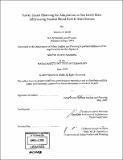Storm smart planning for adaptation to sea level rise : addressing coastal flood risk in East Boston
Author(s)
Wolff, Victoria H
DownloadFull printable version (28.40Mb)
Alternative title
Addressing coastal flood risk in East Boston
Other Contributors
Massachusetts Institute of Technology. Dept. of Urban Studies and Planning.
Advisor
James Wescoat.
Terms of use
Metadata
Show full item recordAbstract
Regardless of how well we implement sustainability plans, now and in the future, the weight of scientific evidence indicates that mean sea level will continue to rise at an increasing rate over the next century. Thus, coastal lands and development lie in a precarious position, increasingly vulnerable to flood damage brought by storm surges and extreme weather events. In order to avoid disastrous losses of property, life, ecological health and social wellbeing, our cities and regions must quickly implement adaptation plans that consider plausible climate models. Coastal risk can be managed through rigid protections, soft landscape solutions, and land use decisions and regulations. In developing and implementing adaptation plans, it is important to understand the options and their applicability to different site contexts. Experts warn that today's once-in-a century flood will likely occur every two or three years by 2050!' However, Boston, like many other U.S. coastal cities, is in the early stages of devising adaptation plans that seek to reduce coastal flood risk from sea level rise. As implementation of adaptation plans may take several years or decades, Boston should act quickly to strategically consider its options. This thesis examines the effectiveness of different planning approaches to hazard mitigation in urban coastal areas and applies them to at-risk sites in East Boston under coastal flood scenarios for the years 2050 and 2100. Two sites in East Boston, one with a soft edge and one with a hard edge, create two distinct urban landscapes for design solutions. (cont.) A menu of planning solutions that has been collected from a review of the literature and best practices is then used to inform design solutions to these problems. By applying contemporary predictions for sea level rise and the problem-specific expertise of coastal management to the site-specific realm of land use planning, I hope to provide a precedent and method for planners, particularly in the Boston area, to seriously incorporate sea level rise predictions into community discussions, regulations, and comprehensive plan making.
Description
Thesis (M.C.P.)--Massachusetts Institute of Technology, Dept. of Urban Studies and Planning, 2009. Includes bibliographical references (p. 67-69).
Date issued
2009Department
Massachusetts Institute of Technology. Department of Urban Studies and PlanningPublisher
Massachusetts Institute of Technology
Keywords
Urban Studies and Planning.